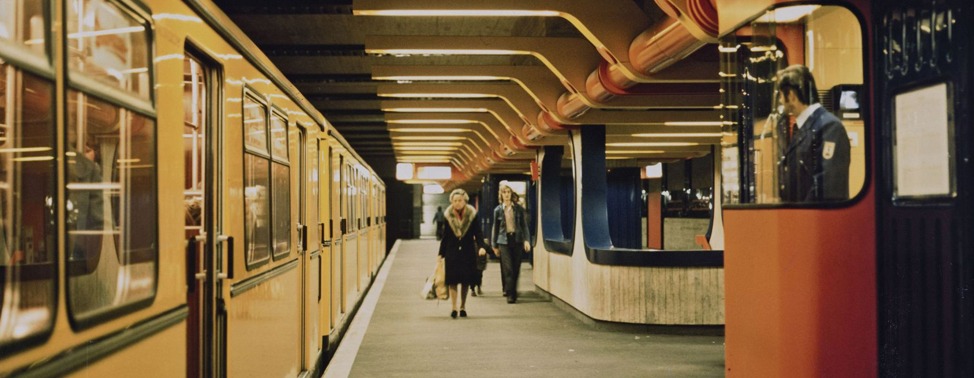Underground Architecture
Berlin Metro Stations 1953-1994 in the Permanent Exhibition
16 Feb - 20 May 2019

Ralf Schüler und Ursulina Schüler-Witte, U-Bahnhof Schloßstraße, Bahnsteig, 1974, Berlinische Galerie © Berlinische Galerie
Plain and functional elegance, colourful Pop Art, a historical cathedral flavour – the metro stations built in Berlin between 1953 and 1994 with their distinctive post-war and post-modernist feel are still a defining feature in the daily lives of Berlin’s residents. Once threatened by radical revamps, 27 of these 82 undergound structures are now listed monuments, thanks to a dedicated younger generation of academics, photographers and film-makers.
The Berlinische Galerie welcomes this opportunity for a début presentation of selected underground stations, including the story of their genesis and the architectural concepts at play. Against the backdrop of a divided city and the two separate German states founded in 1949, the stations Tierpark, Schloßstraße and Rathaus Spandau serve to illustrate how Berlin’s unique role as a theatre of enduring East-West conflict affected even metro design. The chosen exhibits within our Presentation from the Collection highlight the formal diversity of Berlin’s underground stations and their potential as sites of cultural identity.
100 square metres of the permanent display are devoted to some 60 exhibits illustrating the formal diversity acquired by Berlin’s metro architecture over time and the cultural potential of these sites of identification.
Architects and photographers
Chris M. Forsyth (*1995), Bruno Grimmek (1902–1969), Rainer G. Rümmler (1929–2004), Ralf Schüler (1930–2011) and Ursulina Schüler-Witte (*1933)
Academic experts
Ralf Liptau, Verena Pfeiffer-Kloss and Frank Schmitz (Initiative Kerberos), Landesdenkmalamt Berlin
In partnership with Berliner Verkehrsbetriebe (BVG), Historical Archives of the BVG, Landesarchiv Berlin, Deutsches Technikmuseum Berlin
The Berlinische Galerie welcomes this opportunity for a début presentation of selected underground stations, including the story of their genesis and the architectural concepts at play. Against the backdrop of a divided city and the two separate German states founded in 1949, the stations Tierpark, Schloßstraße and Rathaus Spandau serve to illustrate how Berlin’s unique role as a theatre of enduring East-West conflict affected even metro design. The chosen exhibits within our Presentation from the Collection highlight the formal diversity of Berlin’s underground stations and their potential as sites of cultural identity.
100 square metres of the permanent display are devoted to some 60 exhibits illustrating the formal diversity acquired by Berlin’s metro architecture over time and the cultural potential of these sites of identification.
Architects and photographers
Chris M. Forsyth (*1995), Bruno Grimmek (1902–1969), Rainer G. Rümmler (1929–2004), Ralf Schüler (1930–2011) and Ursulina Schüler-Witte (*1933)
Academic experts
Ralf Liptau, Verena Pfeiffer-Kloss and Frank Schmitz (Initiative Kerberos), Landesdenkmalamt Berlin
In partnership with Berliner Verkehrsbetriebe (BVG), Historical Archives of the BVG, Landesarchiv Berlin, Deutsches Technikmuseum Berlin
